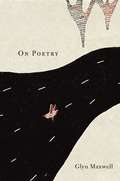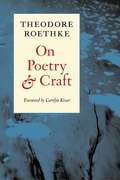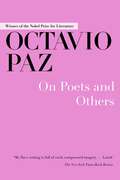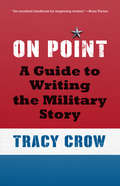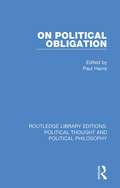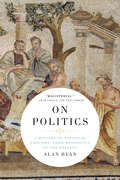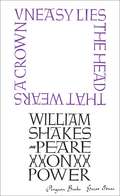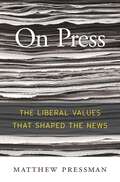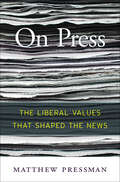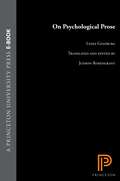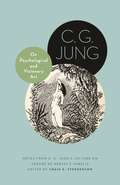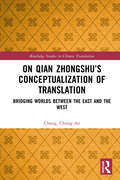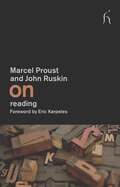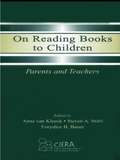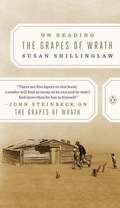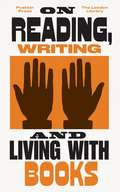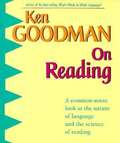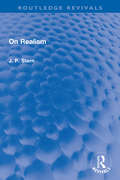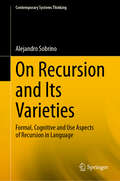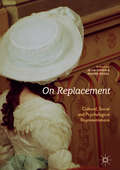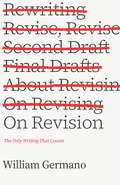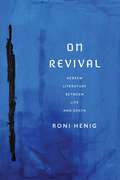- Table View
- List View
On Poe: The Best from American Literature
by Louis J. Budd Edwin H. CadyFrom 1929 to the latest issue, American Literature has been the foremost journal expressing the findings of those who study our national literature. The journal has published the best work of literary historians, critics, and bibliographers, ranging from the founders of the discipline to the best current critics and researchers. The longevity of this excellence lends a special distinction to the articles in American Literature.Presented in order of their first appearance, the articles in each volume constitute a revealing record of developing insights and important shifts of critical emphasis. Each article has opened a fresh line of inquiry, established a fresh perspective on a familiar topic, or settled a question that engaged the interest of experts.
On Poetry
by Glyn Maxwell"“This is a book for anyone,” Glyn Maxwell declares of On Poetry. A guide to the writing of poetry and a defense of the art, it will be especially prized by writers and readers who wish to understand why and how poetic technique matters. When Maxwell states, “With rhyme what matters is the distance between rhymes” or “the line-break is punctuation,” he compresses into simple, memorable phrases a great deal of practical wisdom. In seven chapters whose weird, gnomic titles announce the singularity of the book—“White,” “Black,” “Form,” “Pulse,” “Chime,” “Space,” and “Time”—the poet explores his belief that the greatest verse arises from a harmony of mind and body, and that poetic forms originate in human necessities: breath, heartbeat, footstep, posture. “The sound of form in poetry descended from song, molded by breath, is the sound of that creature yearning to leave a mark. The meter says tick-tock. The rhyme says remember. The whiteness says alone,” Maxwell writes. To illustrate his argument, he draws upon personal touchstones such as Emily Dickinson and Robert Frost. An experienced teacher, Maxwell also takes us inside the world of the creative writing class, where we learn from the experiences of four aspiring poets. “You master form you master time,” Maxwell says. In this guide to the most ancient and sublime of the realms of literature, Maxwell shares his mastery with us."
On Poetry
by Glyn Maxwell"“This is a book for anyone,” Glyn Maxwell declares of On Poetry. A guide to the writing of poetry and a defense of the art, it will be especially prized by writers and readers who wish to understand why and how poetic technique matters. When Maxwell states, “With rhyme what matters is the distance between rhymes” or “the line-break is punctuation,” he compresses into simple, memorable phrases a great deal of practical wisdom. In seven chapters whose weird, gnomic titles announce the singularity of the book—“White,” “Black,” “Form,” “Pulse,” “Chime,” “Space,” and “Time”—the poet explores his belief that the greatest verse arises from a harmony of mind and body, and that poetic forms originate in human necessities: breath, heartbeat, footstep, posture. “The sound of form in poetry descended from song, molded by breath, is the sound of that creature yearning to leave a mark. The meter says tick-tock. The rhyme says remember. The whiteness says alone,” Maxwell writes. To illustrate his argument, he draws upon personal touchstones such as Emily Dickinson and Robert Frost. An experienced teacher, Maxwell also takes us inside the world of the creative writing class, where we learn from the experiences of four aspiring poets. “You master form you master time,” Maxwell says. In this guide to the most ancient and sublime of the realms of literature, Maxwell shares his mastery with us."
On Poetry and Craft
by Carolyn Kizer Theodore Roethke"One of the virtues of good poetry is the fact that it irritates the mediocre."Theodore Roethke was one of the most famous and outspoken poets and poetry teachers this country has ever known. In this volume of selected prose, Roethke articulates his commitments to imaginative possibilities, offers tender advice to young writers, and zings darts at stuffed shirts, lightweights and fools."Art is our defense against hysteria and death."With the assistance of Roethke's widow, this volume has been edited to include the finest selections from out of print collections of prose and journal entries. Focused on the making and teaching of poetry,On Poetry and Craft will be prized in the classroom-and outrageous Roethke quotes will once again pepper our conversations."You must believe a poem is a holy thing, a good poem, that is."Theodore Roethke was of an illustrious generation of poets which included Sexton, Plath, Lowell, Berryman, and like them he received nearly every major award in poetry, including the Pulitzer Prize and twice the National Book Award. In spite of his fame, he remained a legendary teacher, known for the care and attention he gave to his students, poets such as James Wright, Carolyn Kizer, Tess Gallagher, and Richard Hugo. Roethke died on August 1, 1963, while swimming in a friend's pool."But before I'm reduced to an absolute pulp by my own ambivalence, I must say goodbye. The old lion perisheth. Nymphs, I wish you the swoops of many fish. May your search for the abiding be forever furious."On Poetry and CraftI am overwhelmed by the beautiful disorder of poetry, the eternal virginity of words.The poem, even a short time after being written, seems no miracle; unwritten, it seems something beyond the capacity of the gods.We can't escape what we are, and I'm afraid many of my notions about verse (I haven't too many) have been conditioned by the fact that for nearly 25 years I've been trying to teach the young something about the nature of verse by writing it--and that with very little formal knowledge of the subject or previous instruction. So it's going to be lik
On Poets and Others: And Other Essays On Poets And Poetry (Texas Pan American Ser.)
by Octavio Paz Michael SchmidtThe Nobel Prize-winning poet and man of letters Octavio Paz was also a brilliant reader of other writers, and this book selects his best critical essays from over three decades. In the sixteen pieces collected here, Paz discusses a wide range of poets and writers, both American and international, from Robert Frost and Walt Whitman to William Carlos Williams; from Fyodor Dostoevsky to Luis Buñuel to Alexander Solzhenitsyn; and from Charles Baudelaire to Jean-Paul Sartre, André Breton, and Henri Michaux.Paz writes, "I believe that a writer's attitude to language should be that of a lover: fidelity and, at the same time, a lack of respect for the beloved object. Veneration and transgression." When this original thinker meets these writers, each essay is an adventure of the mind.
On Point: A Guide to Writing the Military Story
by Tracy CrowPersonal writing can be risky for anyone, but for military veterans, especially those suffering from post-traumatic stress, sharing stories can trigger painful and disturbing flashbacks. Writing is also risky for the ego. It is one thing to write a military story, especially one based on authentic experiences; it is quite another to muster the courage to share that story with others for critique and feedback. Award-winning journalist and author Tracy Crow presents a roadmap for writing an authentic, persuasive military story. Drawing from her personal experiences and those of other veteran writers, and from the insights of noteworthy writing and teaching professionals, On Point is the guide Crow wishes she’d had when she first began writing about her military experience. No previous writing guide specifically addresses the unique challenges and rewards facing soldiers who want to craft their military story with courage and candor.
On Political Obligation (Routledge Library Editions: Political Thought and Political Philosophy #26)
by Paul HarrisFirst published in 1990. The individual’s obligation to obey the law, the state and the government is a fundamental part of contemporary political theory. The contributors to this volume, drawn from a variety of disciplines including philosophy, political science and law, take a fresh look at the dilemmas of political obligation. They discuss the extent to which we should allow the need for conformity to override individual liberties, and ask whether individualism is indeed feasible without a highly developed sense of the ‘public interest’ or the ‘common good‘. The contrast between individualism and communitarianism is examined throughout the book. The contributors also look at the various means through which the state can coerce or persuade the individual to be obedient. The emphasis throughout this collection is on the substantive problems themselves, rather than on the way these issues have been addressed in the history of political thought. The book offers a number of different perspectives on political obligation, and will be valuable to students of moral, political, social and legal philosophy.
On Politics: From Herodotus to the Present (Liveright Classics Ser. #0)
by Alan RyanThree decades in the making, one of the most ambitious and comprehensive histories of political philosophy in nearly a century. Both a history and an examination of human thought and behavior spanning three thousand years, On Politics thrillingly traces the origins of political philosophy from the ancient Greeks to Machiavelli in Book I and from Hobbes to the present age in Book II. Whether examining Lord Acton's dictum that "absolute power corrupts absolutely" or explicating John Stuart Mill's contention that it is "better to be a human dissatisfied than a pig satisfied," Alan Ryan evokes the lives and minds of our greatest thinkers in a way that makes reading about them a transcendent experience. Whether writing about Plato or Augustine, de Toqueville or Thomas Jefferson, Ryan brings a wisdom to his text that illuminates John Dewey's belief that the role of philosophy is less to see truth than to enhance experience. With this unparalleled tour de force, Ryan emerges in his own right as one of the most influential political philosophers of our time.
On Power
by William ShakespeareThese are Shakespeare's greatest writings on power in all its forms - in love, in war, in politics and in the family. From Macbeth's vaulting ambition to Richard II's fragile grip on authority, from the violent rivalries of King Lear to the exquisite poetry of the love sonnets, these pieces show, with philosophical subtlety and psychological acuity, how we manipulate and dominate each other.Throughout history, some books have changed the world. They have transformed the way we see ourselves - and each other. They have inspired debate, dissent, war and revolution. They have enlightened, outraged, provoked and comforted. They have enriched lives - and destroyed them. Now Penguin brings you the works of the great thinkers, pioneers, radicals and visionaries whose ideas shook civilization and helped make us who we are.
On Press: The Liberal Values That Shaped the News
by Matthew PressmanAs Matthew Pressman’s timely history reveals, during the turbulent 1960s and 70s the core values that held the news industry together broke apart and the distinctive characteristics of contemporary American print journalism emerged. Simply reporting the facts was no longer enough as reporters recognized a need to interpret events for their readers.
On Press: The Liberal Values That Shaped the News
by Matthew PressmanA study of how mainstream journalism transformed from 1960 to 1980.In the 1960s and 1970s, the American press embraced a new way of reporting and selling the news. The causes were many: the proliferation of television, pressure to rectify the news media’s dismal treatment of minorities and women, accusations of bias from left and right, and the migration of affluent subscribers to suburbs. As Matthew Pressman’s timely history reveals, during these tumultuous decades the core values that held the profession together broke apart, and the distinctive characteristics of contemporary American journalism emerged.Simply reporting the facts was no longer enough. In a country facing assassinations, a failing war in Vietnam, and presidential impeachment, reporters recognized a pressing need to interpret and analyze events for their readers. Objectivity and impartiality, the cornerstones of journalistic principle, were not jettisoned, but they were reimagined. Journalists’ adoption of an adversarial relationship with government and big business, along with sympathy for the dispossessed, gave their reporting a distinctly liberal drift. Yet at the same time, “soft news”—lifestyle, arts, entertainment—moved to the forefront of editors’ concerns, as profits took precedence over politics.Today, the American press stands once again at a precipice. Accusations of political bias are more rampant than ever, and there are increasing calls from activists, customers, advertisers, and reporters themselves to rethink the values that drive the industry. As On Press suggests, today’s controversies—the latest iteration of debates that began a half-century ago—will likely take the press in unforeseen directions and challenge its survival.Praise for On Press“The ultimate story behind all the stories. In tracing the evolution of news over the past half century, Matthew Pressman has produced an account that’s deeply historical and not a little troubling. In an age when the press is alternately villain or hero, Pressman serves as a kind of medicine man of journalism, telling us how we got from there to here and warning us what must change.” —Graydon Carter, former editor of Vanity Fair“Pressman helps us understand how we came to our current, troubled media moment with his deeply researched, engagingly written history of America’s press in the 1960s and ’70s. This is an important and original contribution—and a needed one.” —Margaret Sullivan, media columnist for the Washington Post
On Psychological Prose
by Lydia GinzburgComparable in importance to Mikhail Bakhtin, Lydia Ginzburg distinguished herself among Soviet literary critics through her investigation of the social and historical elements that relate verbal art to life in a particular culture. Her work speaks directly to those Western critics who may find that deconstructionist and psychoanalytical strategies by themselves are incapable of addressing the full meaning of literature. Here, in her first book to be translated into English, Ginzburg examines the reciprocal relationship between literature and life by exploring the development of the image of personality as both an aesthetic and social phenomenon. Showing that the boundary between traditional literary genres and other kinds of writing is a historically variable one, Ginzburg discusses a wide range of Western texts from the eighteenth century onward--including familiar letters and other historical and social documents, autobiographies such as the Memoires of Saint-Simon, Rousseau's Confessions, and Herzen's My Past and Thoughts, and the novels of Stendhal, Flaubert, Turgenev, and Tolstoi. A major portion of the study is devoted to Tolstoi's contribution to the literary investigation of personality, especially in his epic panorama of Russian life, War and Peace, and in Anna Karenina.
On Psychological and Visionary Art: Notes from C. G. Jung’s Lecture on Gérard de Nerval's Aurélia (Philemon Foundation Series #12)
by C. G. JungThe first English translation of Jung&’s landmark lecture on Nerval&’s hallucinatory memoirIn 1945, at the end of the Second World War and after a long illness, C. G. Jung delivered a lecture in Zürich on the French Romantic poet Gérard de Nerval. The lecture focused on Nerval's visionary memoir, Aurélia, which the poet wrote in an ambivalent attempt to emerge from madness. Published here for the first time, Jung&’s lecture is both a cautionary psychological tale and a validation of Nerval&’s visionary experience as a genuine encounter.Nerval explored the irrational with lucidity and exquisite craft. He privileged the subjective imagination as a way of fathoming the divine to reconnect with what the Romantics called the life principle. During the years of his greatest creativity, he suffered from madness and was institutionalized eight times. Contrasting an orthodox psychoanalytic interpretation with his own synthetic approach to the unconscious, Jung explains why Nerval was unable to make use of his visionary experiences in his own life. At the same time, Jung emphasizes the validity of Nerval&’s visions, differentiating the psychology of a work of art from the psychology of the artist. The lecture suggests how Jung&’s own experiments with active imagination influenced his reading of Nerval&’s Aurélia as a parallel text to his own Red Book.With Craig Stephenson&’s authoritative introduction, Richard Sieburth&’s award-winning translation of Aurélia, and Alfred Kubin&’s haunting illustrations to the text, and featuring Jung&’s reading marginalia, preliminary notes, and revisions to a 1942 lecture, On Psychological and Visionary Art documents the stages of Jung&’s creative process as he responds to an essential Romantic text.
On Qian Zhongshu’s Conceptualization of Translation: Bridging Worlds between the East and the West (Routledge Studies in Chinese Translation)
by Chang, Chung-AnThis book brings new perspectives and insights to the discipline of translation studies at a time when Western theories dominate its main discourse. By highlighting the significant contribution of Chinese scholar Qian Zhongshu, which encompasses a theoretical probing of the process and product of translation in both China and the West, the author demonstrates how Qian’s reconceptualization of the concept of translation expands the discourse to include and integrate concepts from the history of translation in China. The concept of “huajing,” which is one of these cultural perspectives developed by Qian, transcends the conventional view of translation as a linguistic transfer, envisioning it, instead, as a dynamic realm where encounters with meaning between the textual worlds of China and the West can take place.Through a meticulous analysis of Qian’s profound, though stylistically fragmentary, commentaries, the author reveals how his comparative vision creates connections by breaking down linguistic and cultural barriers, challenging notions of untranslatability that often hinder cross-cultural exchange, and anticipating an inclusive and globalized understanding of translation so urgently needed today.
On Reading (On Series)
by Marcel Proust John Ruskin Damion Searls Eric Karpeles"To understand a profound thought is to have, at the moment one understands it, a profound thought oneself; and this demands some effort, a genuine descent to the heart of oneself . . . Only desire and love give us the strength to make this effort. The only books that we truly absorb are those we read with real appetite, after having worked hard to get them, so great had been our need of them." Reading was, for Marcel Proust, more than the pursuit of knowledge: a truly spiritual activity, it was a means of transforming and transcending the self. By reading great authors, he contends, we not only learn of great ideas, but are enriched by the fruits of the world's most inspirational minds.
On Reading Books to Children: Parents and Teachers
by Eurydice B. Bauer Steven A. Stahl Anne Van KleeckOn Reading Books to Children: Parents and Teachers brings together in one volume current research on adult book reading to children. The authors, drawn from around the world, are key researchers and eminent scholars from the fields of reading and literacy, child language, speech pathology, and psychology, representing multiple perspectives within these disciplines. Chapters on the effects and limitations of book sharing are integrated with chapters discussing promising programs on storybook research. The reality of reading to children is more complex than it appears on the surface. The authors discuss some effects of and suggestions for reading to children that have emerged from the research. The ideas set forth in this volume will stimulate new lines of research on the effects of storybook reading, as well as refinements of current methods, yielding findings that enrich our understanding of this important arena of literacy development.
On Reading The Grapes of Wrath
by Susan ShillinglawOne of today's foremost Steinbeck scholars writes an extended meditation on the influence of The Grapes of Wrath, to commemorate the 75th anniversary of its first publication In this compelling biography of a book, Susan Shillinglaw delves into John Steinbeck's classic to explore the cultural, social, political, scientific, and creative impact of The Grapes of Wrath upon first publication, as well as its enduring legacy. First published in April 1939, Steinbeck's National Book Award-winning epic of the Great Depression chronicles the Dust Bowl migration of the 1930s and the story of one Oklahoma farm family, the Joads, driven from their homestead and forced to travel west to the promised land of California. The story of their struggle remains eerily relevant in today's America and stands as a portrait of the conflict between the powerful and the powerless, "in the souls of the people."
On Reading, Writing and Living with Books
by Charles Dickens George Eliot E. M. Forster Virginia Woolf Leigh HuntThe London Library is the world's largest independent library. Founded in 1841 by Thomas Carlyle (in reaction to the "museum headache" brought on by the crowds in the British Museum Reading Room), it has become a haven for readers, writers and all who draw strength, solace or inspiration from the presence of books. Some of the most illustrious figures of the last two centuries have written, thought and walked there: George Eliot, Charles Dickens, E.M. Forster, Virginia Woolf and many more were members.And over time, some of these celebrated members have shared--with each other, or with an interested public--their views on the delights, challenges and joys of reading, writing and living with books.The books in "Found on the Shelves" have been chosen to give a fascinating insight into the treasures that can be found while browsing in The London Library. Now celebrating its 175th anniversary, with over seventeen miles of shelving and more than a million books, The London Library has become an unrivalled archive of the modes, manners and thoughts of each generation which has helped to form it.From essays on dieting in the 1860s to instructions for gentlewomen on trout-fishing, from advice on the ill health caused by the "modern" craze of bicycling to travelogues from Norway, they are as readable and relevant today as they were more than a century ago.From the Trade Paperback edition.
On Reading: A Common-sense Look At The Nature Of Language And The Science Of Reading
by Kenneth GoodmanKen Goodman's view on reading is widely regarded as the most complete and articulated of any in the world, the basis for much contemporary reading research, theory, and instruction. Indeed, acceptance of Goodman's work is so widespread that his theories have become virtually institutionalized-even as they have prompted controversy. <p><p> On Reading offers a complete explanation of the view that many people in and out of the education field have both accepted and denounced, often without fully understanding its sources and significance. At a time when the movement Goodman helped spawn-whole language theory-is under increasing attack, that explanation is both warranted and welcome. <p> In a clear and engaging style, Goodman explains why he described the reading process as a "psycholinguistic guessing game." He argues that the object of that game is not to recognize letters and words, but to make sense of print: to construct meaning. Among the devices readers use to win that game are miscues, the unexpected responses in oral reading. Many teachers today recognize these "mistakes" as evidence that readers draw upon a wealth of data-graphophonic, syntactic, and semantic-to make sense of print, to predict what comes next, and to construct meaning. <p> Goodman makes the highly complex process of reading easy to understand. He involves his readers in examining their own reading, and he provides real language examples from real children reading real texts-not research-designed controlled samples. In so doing, he proposes that written language is parallel to and equal with oral language and that it is learned in the same way-and for the same reasons-as oral language. <p> Both defenders and detractors of Goodman's work acknowledge him as one of the most influential theorists of the twentieth century. On Reading will be of interest to anyone concerned about the state of education in the twenty-first century.
On Realism (Routledge Revivals)
by J. P. SternFirst published in 1973, On Realism is a comprehensive introduction to the complex problem of literary realism. Written from both a critical and philosophical perspective, the book brings together the concrete study of literary cases and the conceptual analysis of the terms used in describing them. It uses examples drawn from a wide range of European literature and engages in philosophical discussion to argue for a richer and freer sense of the concept than was more commonly in favour at the time of writing. The book describes the literary forms of realism as an art of the 'middle distance' and sets out its character and value against alternatives and distortions - symbolism, naturalism, socialist realism, faits divers, and the literature of language consciousness. On Realism will appeal to those with an interest in literary history, the history of literary theory, and literature and philosophy.
On Recursion and Its Varieties: Formal, Cognitive and Use Aspects of Recursion in Language (Contemporary Systems Thinking)
by Alejandro SobrinoThis book discusses linguistic recursion as a transversal property that runs through different fields, including language, computer science, mathematics, architecture, music, and art. Linguistic recursion, considered since the seminal work of Hauser, Chomsky, and Fitch (2002) the defining characteristic of human language, has no analogue or homologue in other animal communication systems. This book presents different aspects of recursion from a syntactic, semantic, and pragmatic framework. Syntax recursion is largely addressed through the different types of dependencies, most notably those hierarchically composed. The semantic and pragmatic topics are respectively discussed in relation to the theory of mind and a dialogical use of language. Although there are several texts on specific topics of recursion, this is the first that compiles its varieties, pointing out the differences, but also the interrelationships of its core aspects. The book presents recursion as a complex phenomenon related not only to language, but also to other cognitive scenarios, such as working memory, linguistic disabilities, or primitive cultures.
On Replacement: Cultural, Social and Psychological Representations
by Jean Owen Naomi SegalThis book is an interdisciplinary study of the human drama of replacement. Is one’s irreplaceability dependent on surrounding oneself by a replication of others? Is love intrinsically repetitious or built on a fantasy of uniqueness? The sense that a person’s value is blotted out if someone takes their place can be seen in the serial monogamy of our age and in the lives of ‘replacement children’ – children born into a family that has recently lost a child, whom they may even be named after. The book investigates various forms of replacement, including AI and doubling, incest and bedtricks, imposters and revenants, human rights and ‘surrogacy’, and intertextuality and adaptation. The authors highlight the emotions of betrayal, jealousy and desire both within and across generations. On Replacement consists of 24 essays divided into seven sections: What is replacement?, Law & society, Wayward women, Lost children, Replacement films, The Holocaust and Psychoanalysis. The book will appeal to anyone engaged in reading cultural and social representations of replacement.
On Rereading
by Patricia Meyer SpacksAfter retiring from a lifetime of teaching literature, Patricia Meyer Spacks embarked on a year-long project of rereading dozens of novels: childhood favorites, fiction first encountered in young adulthood and never before revisited, books frequently reread, canonical works of literature she was supposed to have liked but didn’t, guilty pleasures (books she oughtn’t to have liked but did), and stories reread for fun vs. those read for the classroom. On Rereading records the sometimes surprising, always fascinating, results of her personal experiment. Spacks addresses a number of intriguing questions raised by the purposeful act of rereading: Why do we reread novels when, in many instances, we can remember the plot? Why, for example, do some lovers of Jane Austen’s fiction reread her novels every year (or oftener)? Why do young children love to hear the same story read aloud every night at bedtime? And why, as adults, do we return to childhood favorites such as The Hobbit, Alice in Wonderland, and the Harry Potter novels? What pleasures does rereading bring? What psychological needs does it answer? What guilt does it induce when life is short and there are so many other things to do (and so many other books to read)? Rereading, Spacks discovers, helps us to make sense of ourselves. It brings us sharply in contact with how we, like the books we reread, have both changed and remained the same.
On Revision: The Only Writing That Counts (Chicago Guides to Writing, Editing, and Publishing)
by William GermanoA trusted editor turns his attention to the most important part of writing: revision.“On Revision provides everything academic writers need to know about crafting superior essays, articles, monographs, and dissertations. . . . Essential for anyone facing down the vast and mysterious landscape of academic writing; invaluable for students and educators alike.” —BooklistSo you’ve just finished writing something? Congratulations! Now revise it. Because revision is about getting from good to better, and it’s only finished when you decide to stop. But where to begin? In On Revision, William Germano shows authors how to take on the most critical stage of writing anything: rewriting it.For more than twenty years, thousands of writers have turned to Germano for his insider’s take on navigating the world of publishing. A professor, author, and veteran of the book industry, Germano knows what editors want and what writers need to know: Revising is not just correcting typos. Revising is about listening and seeing again. Revising is a rethinking of the principles from the ground up to understand why the writer is doing something, why they’re going somewhere, and why they’re taking the reader along with them.On Revision steps back to take in the big picture, showing authors how to hear their own writing voice and how to reread their work as if they didn’t write it. On Revision will show you how to know when your writing is actually done—and, until it is, what you need to do to get it there.“An eloquent example of all that it espouses.” —The Times Literary Supplement (UK)“The advice compiled in this revelatory, generous book—tips on discovering or rediscovering your argument, on organizing its archive, on helping your readers identify its takeaways—will be useful for everyone from seasoned authors to dissertating graduate students.” —Deidre Lynch, author of Loving Literature: A Cultural History“Clear, compelling, vital. The book is a pleasure to read, and it reveals the pleasures in revising one’s writing. . . . A must read.” —Ayanna Thompson, Regents Professor, Arizona State University
On Revival: Hebrew Literature Between Life and Death (Jewish Culture and Contexts)
by Roni HenigA critique of the discourse of language revival in modern Hebrew literatureOn Revival is a critique of one of the most important tenets of Zionist thinking: “Hebrew revival,” or the idea that Hebrew—a largely unspoken language before the twentieth century—was revitalized as part of a broader national “revival” which ultimately led to the establishment of the Israeli nation-state. This story of language revival has been commemorated in Israeli popular memory and in Jewish historiography as a triumphant transformation narrative that marks the success of the Zionist revolution. But a closer look at the work of early twentieth-century Hebrew writers reveals different sentiments.Roni Henig explores the loaded, figurative discourse of revival in the work of Hebrew authors and thinkers working roughly between 1890 and 1920. For these authors, the language once known as “the holy tongue” became a vernacular in the making. Rather than embracing “revival” as a neutral, descriptive term, Henig takes a critical approach, employing close readings of canonical texts to analyze the primary tropes used to articulate this aesthetic and political project of “reviving” Hebrew. She shows that for many writers, the national mission of language revival was entwined with a sense of mourning and loss. These writers perceived—and simultaneously produced—the language as neither dead nor fully alive. Henig argues that it is this figure of the living-dead that lies at the heart of the revival discourse and which is constitutive of Jewish nationalism.On Revival contributes to current debates in comparative literary studies by addressing the limitations of the national language paradigm and thinking beyond concepts of origin, nativity, and possession in language. Informed by critical literary theory, including feminist and postcolonial critiques, the book challenges Zionism’s monolingual lens and the auto-Orientalism involved in the project of revival, questioning charged ideological concepts such as “native speaker” and “mother tongue.”

